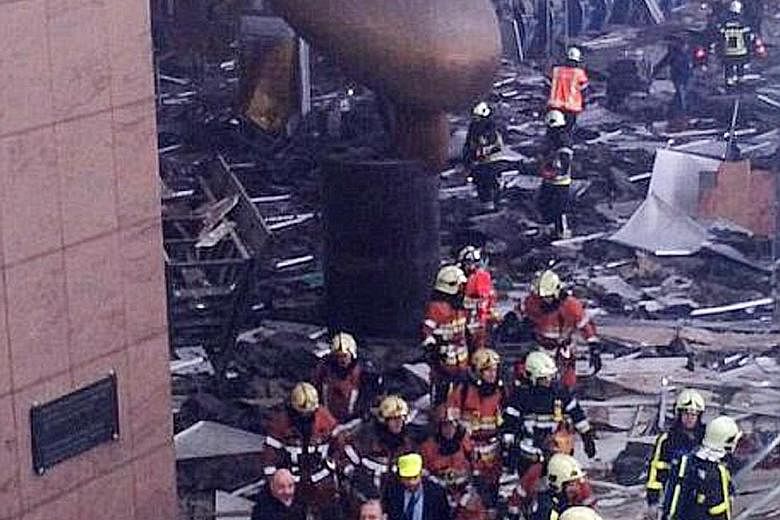Brussels was rocked by multiple blasts that left nearly three dozen people dead yesterday, casting a pall over Europe as countries scrambled to tighten security at home.
Belgian Prime Minister Charles Michel called it "a black day" and raised the country's terror alert to the highest level after explosions tore through the international airport and a busy metro station, killing 34 people and wounding 187.
The Islamic State in Iraq and Syria (ISIS) claimed responsibility for the attacks, which came four days after the capture in Brussels of Salah Abdeslam, wanted for his suspected role in the Nov 13 attacks in Paris that were also claimed by ISIS.
The Belgian authorities released a picture of three suspects at the airport pushing trolleys with suitcases.
The first two blasts ripped through the main terminal at Brussels Airport just before 8am (3pm in Singapore), bringing down a ceiling near check-in counters. Witnesses spoke of panic and gruesome scenes of dismembered bodies.

"A man shouted a few words in Arabic and then I heard a huge blast," airport baggage security officer Alphonse Lyoura told Agence France-Presse. About an hour later, a third blast hit commuters at Maelbeek station, which is close to European Union offices.
"Our fears have become reality," said Mr Michel, confirming that the airport attack was a suicide bombing and calling on his people to "show calmness and solidarity".
Analysts were quick to suggest that yesterday's bombings could be a retaliatory attack. During last Friday's raid, police said they uncovered a large number of weapons and believed that Abdeslam was planning more attacks from Brussels.
Brussels shut its public transport network after the blasts.
Other European states swiftly stepped up security at airports and other key areas: France deployed an extra 1,600 police officers to its borders, and Britain mobilised police officers to patrol transport hubs and potentially vulnerable locations.
Singapore joined world leaders in condemning the attacks and vowed to stand with Belgium.
Prime Minister Lee Hsien Loong wrote to his Belgian counterpart to offer his condolences and said Singapore "strongly condemns these appalling acts".
Last Friday, Home Affairs Minister K. Shanmugam warned that the rise of ISIS means that the threat of a terror attack in Singapore is at its highest level in recent times.
Deputy Prime Minister and Coordinating Minister for National Security Teo Chee Hean said yesterday that the Brussels attacks show "the difficulty that any country, even one which is on high alert... faces in making sure that these incidents don't take place at all".
SEE TOP OF THE NEWS
'It's war... Everything was destroyed'
Brussels suburb a hotbed of radicals

